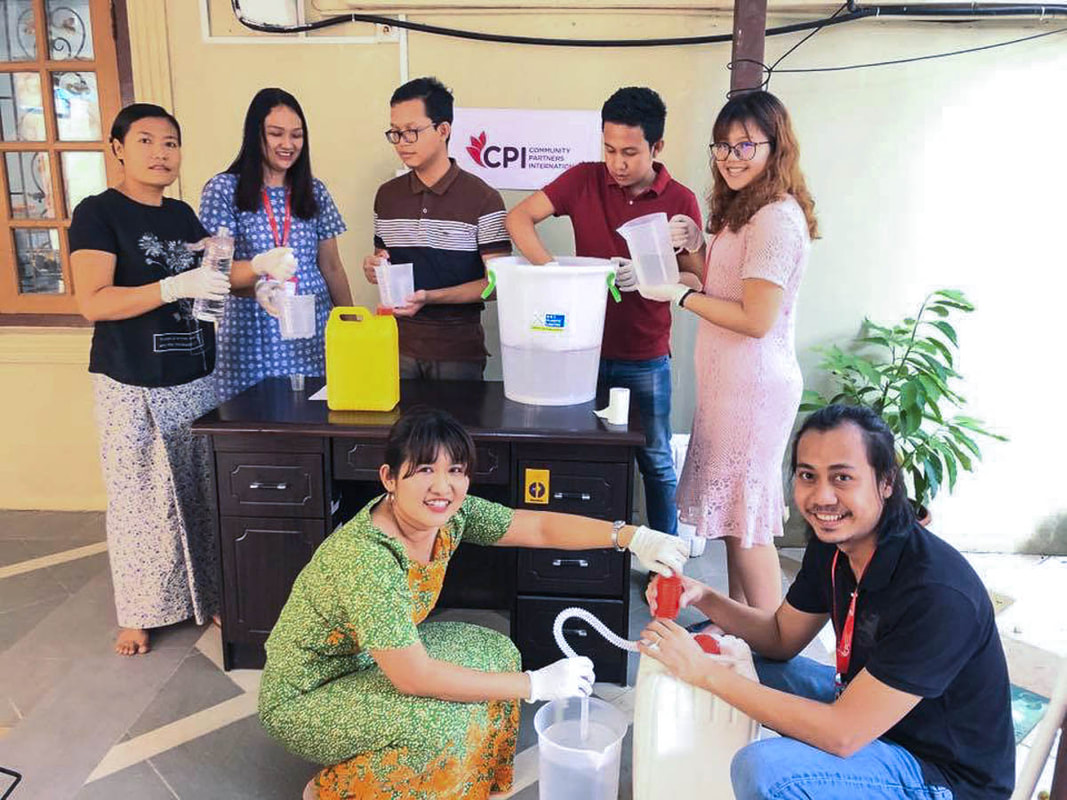|
On March 24, Myanmar announced its first two confirmed cases of COVID-19. The day before, with the supply of hand sanitizer diminishing rapidly and the retail price rising fourfold in a short period of time, Community Partners International (CPI)'s Myanmar team started to produce it in their office in Yangon. It was already clear that the network of community-based clinics and health workers serving hundreds of thousands of vulnerable people in displacement camps, remote communities and urban slums across Myanmar would struggle to source sufficient quantities of hand sanitizer to meet their needs. By sourcing the raw materials early, and producing it themselves, CPI's Myanmar team planned to help bridge the gap and reduce the spread of COVID-19. Up to that point, the country had been holding its breath as the virus moved through Asia. With a 1,400 mile border with China, and with other neighboring countries reporting cases, it seemed only a matter of time before COVID-19 would reach Myanmar. Community Partners International (CPI)'s Myanmar teams had already begun contingency planning with the Ministry of Health and Sports (MoHS) and ethnic and community-based health organization partners across the country. In light of the country's fragile health system, it was clear from the outset that COVID-19 could have a devastating impact and that it was necessary to move rapidly to save lives. Using a WHO-recommended formula consisting of ethanol, hydrogen peroxide, glycerol and sterile distilled water, the team set up a makeshift production facility and began to prepare the first batch. Just over two weeks later on April 7, the team had produced a total of 3,043.5 liters of hand sanitizer. During this period, CPI's logistics team oversaw the distribution of more than 2,500 liters to state and district health departments and 180 ethnic and community-based clinics in Kachin, Kayah, Kayin, Mon, Shan, and Rakhine States, and Ayeyarwady and Tanintharyi Regions. This network of clinics alone serves more than 500,000 people in vulnerable communities, including internally displaced populations in 16 displacement sites. As news of these activities reached partners and peer organizations, CPI received requests to provide instructions in Myanmar language on how to make the hand sanitizer, In response, CPI's Myanmar team published the following short video showing the process: CPI is continuing to work closely with vulnerable communities across Myanmar, focusing on rapid action, agile response, and innovative approaches to help save lives. Donate to support CPI's COVID-19 Emergency Response in Myanmar and Bangladesh: Donate Now Comments are closed.
|
AuthorCPI Admin Archives
July 2024
Categories
All
|
|
|
COMMUNITY PARTNERS INTERNATIONAL
580 California St Fl 16, Ste 1658, San Francisco, CA 94104-1068, USA [email protected] +1 510 225 9676 We are a registered nonprofit 501(c)(3) Public Charity. TAX ID 94-3375666 |
©
Community Partners International


 RSS Feed
RSS Feed
